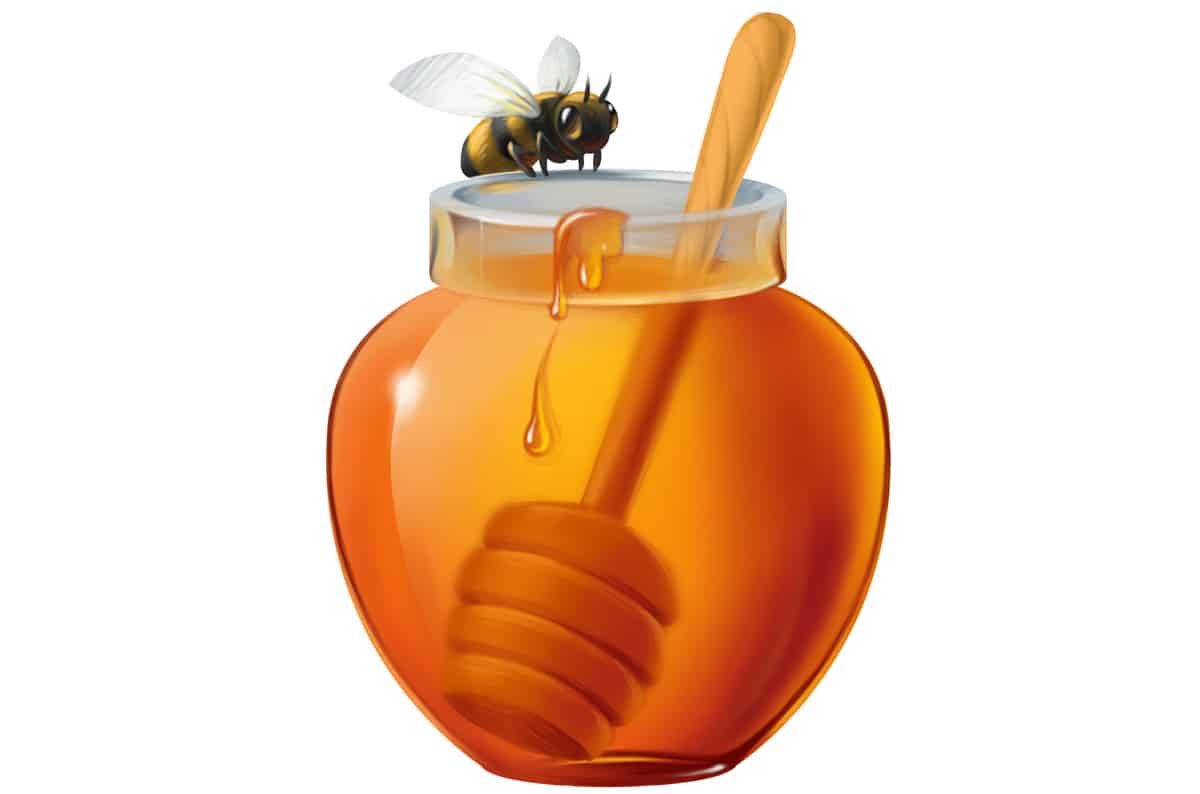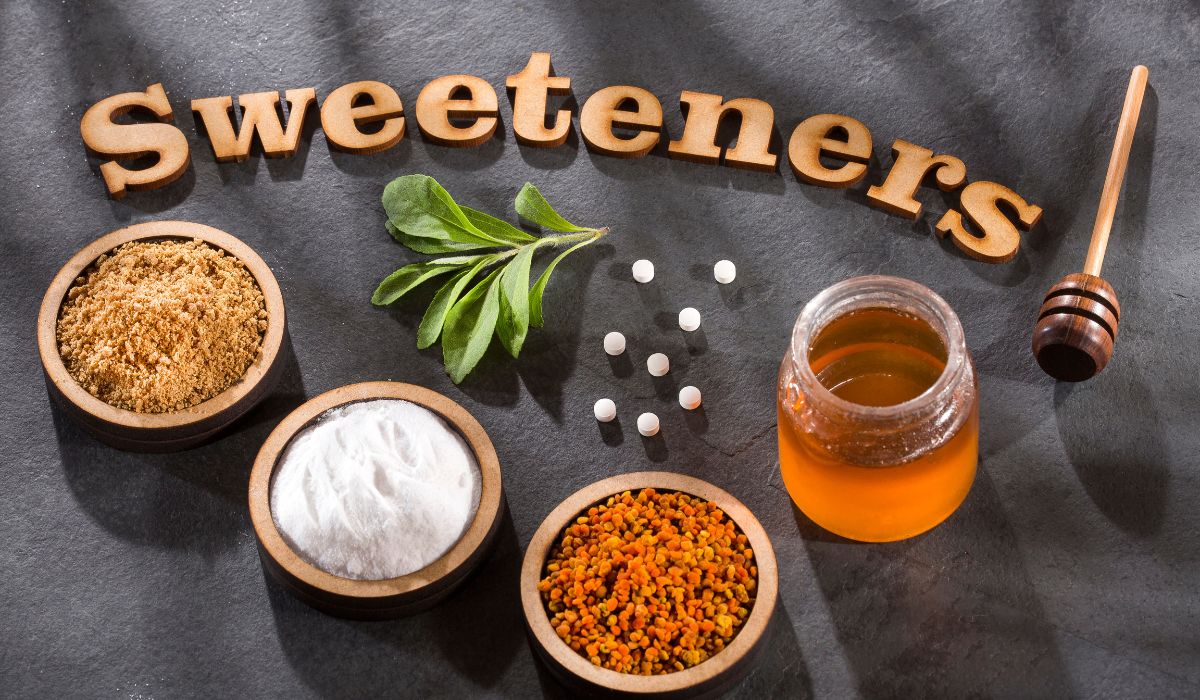Sweeteners are tricky on keto. Carb-dense sweeteners, even "natural" ones like honey, are pretty much out because...well, “carb-dense” really says it all. But 0-carb/0-calorie sweeteners aren't necessarily perfect choices - some have fillers that can add to the carb counts, while others can cause digestive problems, and there’s a huge open question about how they affect the gut biome.
For beginners, here’s a quick overview of four different categories of sweeteners:
- Sugar (and other names for sugar, like "cane juice")
- Natural sweeteners (honey, maple syrup, stevia etc.)
- Artificial sweeteners (brand names Sweet’n’low, Splenda, Equal, etc.): Saccharin, cyclamate, acesulfame, aspartame, sucralose, etc.
- Sugar alcohols: Erythritol, xylitol, mannitol, other things that end in -ol.
If that sounds like a lot of names and categories too keep track of, don’t sweat it. We’re cutting through the confusion with a quick list of must-knows:
1. You might not even want much sweetness on keto.
Before you start worrying about what sweetener to use, are you sure it’s even going to be a problem?
Quite a few studies, like this one and this one, indicate that even modest carb restriction can reduce carb/sugar cravings after a few weeks. (For more on this process and how it works, see here).
It's true that some people do still enjoy sweeteners even on keto. If that’s you, and if you can find one that doesn't compromise your health or other goals, there's no reason to deprive yourself of something you enjoy. But you might be surprised by what happens when you give your body a chance to re-set its own taste preferences - the “need” for sweeteners suddenly becomes a lot less pressing.
2. "Natural” doesn’t mean low-carb.
Assuming you do want a sweetener, don't fall for the "natural = keto = good" trap.

“Natural” is not a synonym for “keto-friendly.” A lot of “natural” sweeteners have way too many carbs for keto (“natural” in scare quotes because there’s no real agreed-on definition, so at this point the word is basically a meaningless marketing term anyway). Take a look at some comparative carb counts, per teaspoon (data from the USDA nutrition database):
- White sugar: 4.2 grams
- Brown sugar: 4.5 grams
- Turbinado sugar: 4.6 grams
- Honey: 5.75 grams
- Maple syrup: 4.5 grams
- Agave nectar: 5.3 grams
- Molasses: 5 grams
In other words, most “natural” sweeteners have at least as many carbs per teaspoon as ordinary table sugar. None of these are keto-friendly in large quantities, regardless of how “natural” they might be.
None of this applies to stevia: stevia is marketed as “natural,” just like honey or maple syrup, but unlike honey and maple syrup, it has no carbs. Stevia is safe for keto, not because it’s “natural,” but because it doesn’t have any carbs.
Cutting out Paleo staples like honey leaves you with 0-calorie sweeteners, including sugar alcohols (xylitol, erythritol, mannitol…) artificial sweeteners (aspartame, sucralose, ace-K…), and oddballs like stevia. So now let’s take a look at those:
3. Of the sugar alcohols, erythritol is least likely to mess up your gut.
Sugar alcohols (sorbitol, mannitol, and anything else that ends in -ol) don’t have as many carbs as regular sugar, and the carbs in sugar alcohols aren’t fully digested, so you get even fewer carbs than you see on the label. Some low-carb diets actually claim you can just not count sugar alcohols because they aren’t really digested. On the other hand, some sugar alcohols (like xylitol) may be anti-ketogenic in other ways, so they’re not necessarily great for keto just because they don’t have a lot of carbs.
Also, that incomplete digestion “benefit” might not be so great. Because sugar alcohols aren’t really digested, a lot of folks find they cause gas, bloating, diarrhea, and other GI problems. They're in the FODMAP group of carbohydrates, which includes other "musical" foods like beans and Brussels sprouts.
In small amounts, a lot of people don’t have an issue with sugar alcohols, but if you’re going to pick a staple keto sweetener, they might not be a very gut-friendly choice. The exception is erythritol. Erythritol gets absorbed in the small intestine and most of it comes right out in your urine, so it doesn’t cause the same gas/bloating/cramping issues that other sugar alcohols do. For example, in this study, researchers found that xylitol caused a lot of digestive issues for people, but that erythritol was significantly easier to tolerate, with almost no symptoms at 20-35-gram doses.
If sugar alcohols are going to be your game, research suggests that erythritol is least likely to trigger any uncomfortable GI symptoms.
4. Studies show that successful keto diets can include artificial sweeteners.
Another category of sweeteners is artificial sweeteners, like aspartame and sucralose (these are the blue/pink/yellow packets that you find alongside real sugar everywhere)
There’s a lot of knee-jerk bashing of anything with the word “artificial” in the name, but just like “natural” sweeteners aren’t automatically keto-friendly, “artificial” sweeteners aren’t automatically out. Whether or not they’re good for health is a different question, but when it comes specifically to ketosis, a couple studies have shown that it’s possible to successfully use artificial sweeteners in a ketogenic diet:
- In this study, researchers gave children saccharin (Sweet’n’low) every day and they stayed in ketosis just fine.
- In this study, the researchers successfully treated 22 obese subject with a ketogenic diet based on the Mediterranean Diet. The diet allowed artificial sweeteners, including saccharin, cyclamate, acesulfame, aspartame, and sucralose. The patients lost about 14 kilograms (about 31 pounds) and dramatically improved their metabolic health over 12 weeks of that.
But on the other hand…
5. It’s not clear how 0-calorie sweeteners affect the gut biome.

Just because artificial sweeteners don’t throw you out of ketosis doesn’t make them good for you.
A 2012 review concluded that “most studies in humans have not detected effects of non-nutritive sweeteners on gut hormones or glucose absorption.” It just didn’t seem to be true that artificial sweeteners caused metabolic problems, gave people diabetes, made people extra hungry, or did anything else to cause weight gain.
But in 2014, a new study looked at a different issue: the gut bacteria. This study found that artificial sweeteners might cause metabolic problems (glucose intolerance) by messing up the gut bacteria. 2014 was a while ago now, but by the time this study was published in 2017, the issue was still controversial.
That could be especially bad news if you’re going keto in response to any kind of carb-related issues (metabolic syndrome, insulin resistance, blood sugar issues…). So especially for people who struggle with blood sugar and insulin resistance, this is a pretty significant open question.
6. For brand-name sweeteners, check the fillers for carbs!
With some artificial sweeteners, you only need a tiny little bit to get the same sweetness as a whole tablespoon of sugar. But it’s inconvenient to deal with such tiny physical amounts of sweeteners, especially if you’re baking and want to measure things. So most companies mix those compounds with different fillers so that you can measure them like sugar.
The bad news: some of those fillers have carbs, so some of the brand-name products that use artificial sweeteners have carbs from the fillers. For example, Splenda (which gets sweetness from the artificial sweetener sucralose) and Equal (aspartame) both have about 0.9 carbs per 1 packet, and sweet’n’low has about 1 gram. (Data from the USDA nutrition database)
A packet or two of these sweeteners isn’t going to break anyone’s carb budget, but be careful when you start getting into the keto baking - if you’re using a cup of granulated Splenda, that’s a lot of carbs! In general, liquid sweeteners have fewer fillers (although that makes them less convenient for baking) - do your research, know your own carb tolerance.
This is also true for sweeteners made with stevia: check any fillers that are added to the stevia before you buy. Stevia itself is fine for keto, but the fillers might not be.
7. A good place to start is a “safe” formulation of stevia.
After all that, one practical suggestion: if you’re going to start somewhere, liquid stevia or a granular stevia without carb-containing fillers might be a good first choice. The health benefits of stevia may have been overstated (everyone wants to believe there’s a 0-calorie, 0-carb sweetener that’s actually good for you, but that doesn’t make it true!), but research generally shows that it doesn’t mess up blood sugar control and is safe and possibly beneficial, if not miraculous, for people with metabolic problems.
What’s your favorite keto-friendly sweetener? Do you even use one? Let us know on Facebook or Twitter!





Leave a Reply